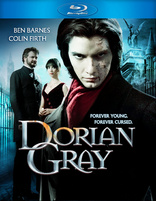Dorian Gray Blu-ray Movie
HomeDorian Gray Blu-ray Movie 
National Entertainment Media | 2009 | 112 min | Rated R | Aug 24, 2010Movie rating
6 | / 10 |
Blu-ray rating
| Users | 3.8 | |
| Reviewer | 3.5 | |
| Overall | 3.7 |
Overview
Dorian Gray (2009)
The strikingly beautiful but naive young Dorian Gray, arriving fresh on the London social scene, is taken under the wing of Lord Henry Wotton who introduces him to the seedy pleasures of the city’s life. When an artist paints a portrait of Dorian to catch the full power of his youthful beauty, Dorian swears he would give anything to stay as he is in the picture – even his soul. Dorian’s stunning good looks and charm soon attract the celebrity lifestyle and everything that it brings, and he finds himself slipping deeper and deeper into a world of sin, sex and violence, seemingly without any consequences. But as his actions become increasingly evil, how long can he hide the secret behind his eternal youth?
Starring: Ben Barnes, Colin Firth, Rachel Hurd-Wood, Rebecca Hall, Emilia FoxDirector: Oliver Parker
| Fantasy | Uncertain |
| Thriller | Uncertain |
| Supernatural | Uncertain |
| Mystery | Uncertain |
| Drama | Uncertain |
Specifications
Video
Video codec: VC-1
Video resolution: 1080p
Aspect ratio: 1.85:1
Original aspect ratio: 1.85:1
Audio
English: DTS-HD Master Audio 5.1 (48kHz, 16-bit)
English: Dolby Digital 5.1 (448 kbps)
Subtitles
English, English SDH
Discs
25GB Blu-ray Disc
Single disc (1 BD)
Playback
Region A (B, C untested)
Review
Rating summary
| Movie | 3.5 | |
| Video | 4.0 | |
| Audio | 4.5 | |
| Extras | 2.5 | |
| Overall | 3.5 |
Dorian Gray Blu-ray Movie Review
Like Oscar Wilde's character himself, 'Dorian Gray' has proven to be a timeless commodity for film and television adapters.
Reviewed by Jeffrey Kauffman August 23, 2010Have you ever had something relatively innocuous happen to you that has just struck you as laugh out loud hilarious? Years ago, before I had gotten married and had kids, I, like a lot of twenty-somethings, lived in a shared housing situation. Though I was the only official “renter,” I had my landlord’s blessing to sublease the other bedrooms, and a series of truly strange people passed through my rental home’s halls, like some figments from Federico Fellini’s imagination. There was the forty-something pizza delivery guy who was carrying on an illicit affair with the underage Catholic schoolgirl (uniform and all). There was the LSD gobbling artist whose girlfriend worked in the zoo’s reptile house and kept dead rats in our freezer to feed the python she was nursing back to health. And yet even with these stranger than fiction roomies, one completely understated event tipped me over into gasping gales of laughter one evening which I will probably never forget. An old rerun of Murder, She Wrote was on, and for some reason several of us were gathered around the television watching. All of a sudden, one of the guest stars appeared onscreen and housemate Annie, a sweet but patently odd southern belle from New Orleans, blurted out, “Ooooh! Hurd Hatfield!” The breathless glee with which she greeted this little known and probably even less remembered actor, a response so giddy and excited I would have expected her to have just spotted a Beatle in our living room, just struck me as instantly guffaw-worthy, and I was going, going, gone for quite a while afterwards.
While Hatfield was relegated to guest starring status in series like Murder, She Wrote and The Wild, Wild West late in his career, he had amassed a long, if not overly impressive, array of credits from the 1940’s on, though his name had hardly become a household commodity (in all but Annie’s household, that is). Hatfield’s most lasting and well remembered role was in his second film, the glossy MGM adaptation of Oscar Wilde’s The Picture of Dorian Gray. While the 1945 film adaptation had all the sheen and refined patina one would expect from a Metro feature at the acme of the Golden Age of Hollywood, Hatfield was a strangely cold, and frankly not very attractive, choice for Dorian, a role which is based as much on physical beauty as anything else. The Metro version also, as in so many literary adaptations from that era, shied away from anything even remotely controversial, leaving Wilde’s biting wit and social observations (not to mention his not very covert homoeroticism) largely in the dust. We of course live in freer, dare I say more Dorian times ourselves now, where hedonism isn’t frowned upon with quite the same vigor it was in the mid-20th century, and so a “new, improved” adaptation of Wilde’s formidable novel might seem to be a good idea.
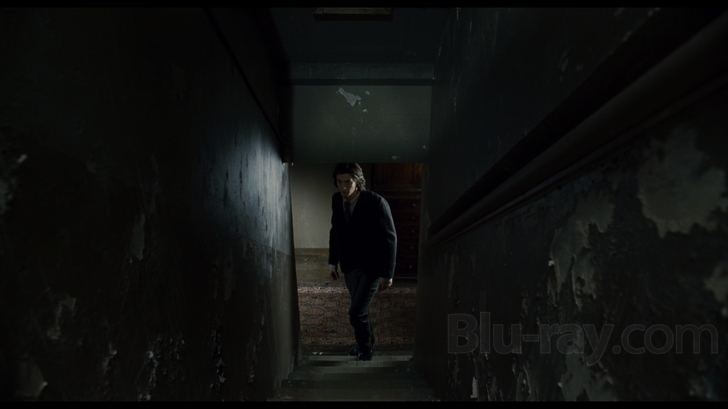
What is Dorian hiding in his attic?
Oscar Wilde was a famously conflicted soul, and he made no bones about the three main characters in Dorian Gray all being facets of his own personality. If Dorian’s libertine proclivities were the ultimate fantasy for Wilde of what an unencumbered life could be like, his creations of artist Basil Hallward and nobleman Lord Henry Wotton were twin reflections (in Wilde’s mind, anyway) of how he perceived himself and how he believed others perceived him. I’ll leave it to social commentators far wiser than I to delve the psychological depths of Wilde’s homosexuality, and how it may have influenced a book where, to paraphrase a certain Saturday Night Live skit, “looking MAH-velous” was vastly more important than how one behaved, and, indeed, became in Wilde’s conception an actual replacement for behavioral excesses, let alone sins. The supernatural overtones of Dorian Gray are never really dealt with in either this version, or many of the others which have littered the film and television landscape through the years. We are simply invited into a world where Dorian (Ben Barnes) pledges his soul to always stay as he has been portrayed in a painting by Hallward (Ben Chaplin). This figurative deal with the devil plays out, with, of course, the painting itself taking on the slings and arrows of Dorian’s outrageous fate, a fate channeled by the hedonistic tendencies of his mentor, Lord Henry (Colin Firth).
Alas what seems like a good idea, much like Dorian’s flippant pledge, often finds itself a victim of that old bugaboo “the devil is in the details.” Scenarist Toby Finlay may not have jettisoned the unseemly aspects of Wilde’s original story the way the 1945 MGM outing did, but he’s made an equal, albeit opposite, mistake. He’s tarted up the story with an almost Grand Guignol, lurid aspect, as well as having Dorian live well into the 20th century, coming into contact with such movements as the suffragettes and the Jazz Age. There’s also a discomfiting incongruity between Henry’s early attempts to lure Dorian into a life of heedless pleasure seeking and then, years later, his disdain for Dorian’s evident success in that very quest. While some of that incongruity is ameliorated by Dorian’s final screaming accusations aimed at Henry, pointing out Dorian has simply become everything that Henry wanted, but was afraid, to become, there’s still too much artifice to make the characterizations completely believable. In fact the whole final act of this Dorian Gray often devolves into melodramatic silliness, with at least one unexpected laugh out loud moment. After the modern-day Dorian is chased into a subway and his nemesis is killed, Dorian emits a very meek, “Sorry,” which, if it had included “about that” could have come out of the mouth of Don Adams in a Get Smart episode.
This is nonetheless a very handsome production with two solid performances by Barnes and Firth. Barnes, unlike Hatfield, is a physically striking young man who at the same time is able to conjure a sinister ambience as Dorian’s moral turpitude grows by leaps and bounds. Firth, though somewhat hamstrung by the illogicalities of the screenplay, is slyly commanding, much indeed as one might imagine Wilde himself to be—a hedonist with a very active wit. He also brings a neat gravitas to the elderly Henry which helps to at least partially offset the problems with the screenplay. The production design is quite impressive here, and director Oliver Parker (brother of Inspector Lynley’s Nathaniel Parker) mounts the proceedings with flash, if occasionally a bit too many handheld jiggliness and quick cut gimmicks.
Dorian Gray Blu-ray Movie, Video Quality 
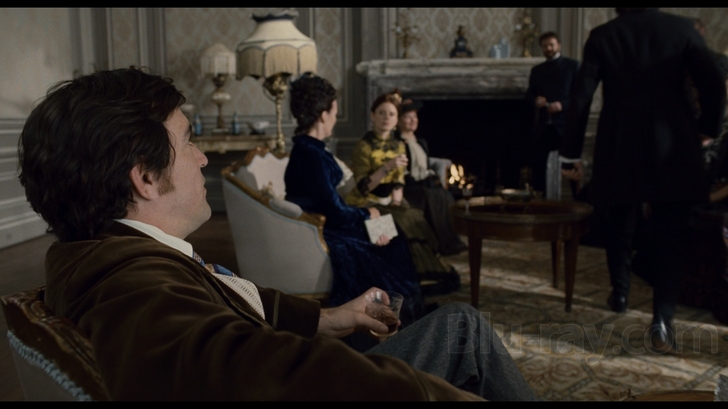
There's quite a bit of CGI, set extensions and desaturated post-processing work in this VC-1 encoded 1080p image (in 1.78:1), so the Blu-ray presentation, while always sharp and filled with detail, has a certain bluish tint that does very well in the creepier, night scenes, but which leaves some of the daytime scenes looking a bit pale at times. Despite some of the intentional blanching issues, colors are generally very robust, especially in the opening segments, where Edwardian England is presented in all its finery. While some of the CGI is less than ILM-esque (some of the set extensions are noticeably fake looking), the special effects with regard to the painting are quite impressive, giving a suitable shiver up the spine at the film's climax. Black levels are consistent and contrast is excellent if one looks past the desaturation. Best of all, no artifacting was present, despite an abundance of patterened costumes, fences, grills, and leaves.
Dorian Gray Blu-ray Movie, Audio Quality 
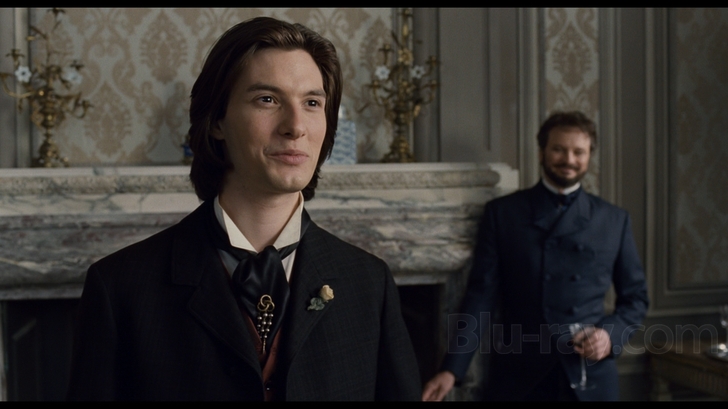
Dorian Gray's DTS-HD Master Audio 5.1 mix fares best, as might be expected, in the gloomier, moodier aspects of the film, with some extremely robust low end, in both underscore and foley effects, that fill the listener with a palpable sense of the ominous. Surrounds are utilized relatively sparingly, mostly for some of the aformentioned foley effects, and in some of the outdoor scenes. Otherwise, this is a crisp audio presentation, if not overly directional, with solid reproduction of dialogue, effects and music. But it's the LFE that will probably linger with most viewers long after the film has ended.
Dorian Gray Blu-ray Movie, Special Features and Extras 
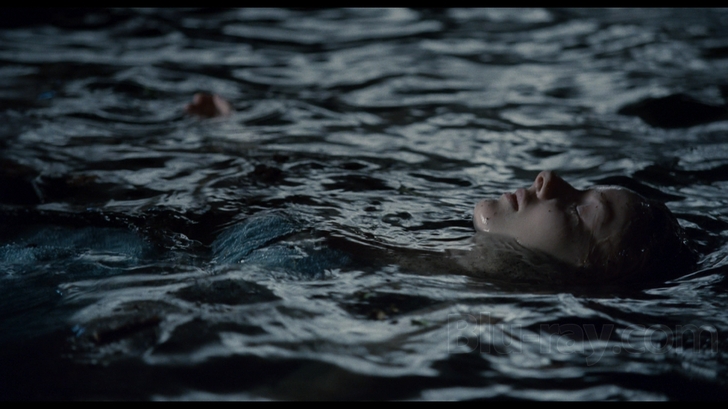
Some good to excellent SD supplements are included on this Blu-ray, including:
- A Commentary featuring Parker and Finlay where they discuss the challenges of adapting such a recondite property.
- Several short Featurettes, including: Make Up and Wardrobe (2:17), which shows several extras being clad and make up effects are discussed; The Painting (1:27), focusing on artist Paul Benay; Smithfield Market (2:08), one of several green screen set extensions done for the film; and Visual Effects (4:15), where those set extensions, as well as some of the other CGI are featured.
- A Costume Design Photo Gallery (1:46), which is in fact a costume design drawing gallery.
- Deleted Scenes (5:59), are mostly non-noteworthy, though a couple help to give a little bit more nuance to the good side of Dorian.
- Blooper Reel (9:24) is your typical grabbag of actors laughing at inside jokes and knocking over items on the set.
Dorian Gray Blu-ray Movie, Overall Score and Recommendation

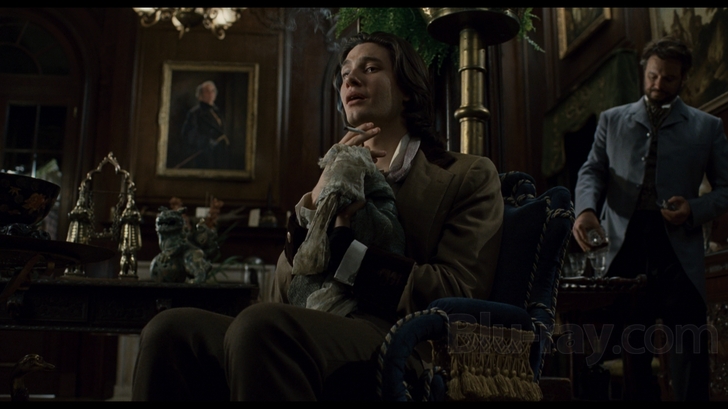
This Dorian Gray sports excellent performances and a moody ambience, but unfortunately it strays too far from its source material and adds too many melodramatic moments in its final third, which tend to make it play more like a movie of the week than a feature film. Nonetheless, it's a nice looking production, and Barnes and Firth are commanding enough that this merits a recommendation, at least for a rental.
Similar titles
Similar titles you might also like

True Blood: The Complete Series
2008-2014

Lady in the Water
2006

Franklyn
2008

Red Riding Hood
Alternate Cut
2011

Sleepy Hollow: The Complete First Season
2013

Hogfather
2006

The Crow: Salvation
2000

The Invisible
2007

Abraham Lincoln: Vampire Hunter 3D
2012

The Picture of Dorian Gray
Warner Archive Collection
1945

Carnivàle: The Complete Series
2003-2005

After the Dark
2013

Slipstream
2007

Mona Lisa and the Blood Moon
2021

Down a Dark Hall
2018

The Night My Number Came Up
1955

Lost River
2014

The Crow: City of Angels
1996

I Kill Giants
2017

The Crow: Wicked Prayer
2005
